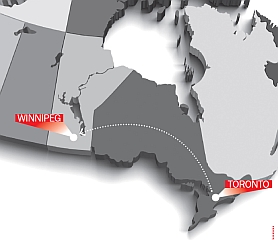Ontario is at risk of losing out on major capital infusions as potential investors in the legal industry flock to provinces that are out in front on the alternative business structure curve.
“As investors seeking to take advantage of the profession’s evolution realize there may be advantages in operating in other jurisdictions, Ontario will find itself behind the eight ball and will have to play catch-up,” says Peter Carayiannis, President of Toronto-based Conduit Law Professional Corp., a non-traditional 11-lawyer firm that provides in-house counsel with lawyers “to address your needs as they emerge within your business.”
In May, the Manitoba government proposed legislative amendments that would give the Law Society of Manitoba new powers to regulate law firms, instead of just lawyers. Passage of the amendments to the Legal Profession Act would make Manitoba the fourth province to allow law firm regulation, following Nova Scotia, British Columbia and Saskatchewan.
Law firm regulation is widely regarded as an effective method of dealing with the perceived deterioration in ethical standards that critics of ABS regimes foresee and therefore as a definitive step toward recognition of ABS.
Malcolm Mercer in McCarthy Tétrault LLP’s Toronto office, who heads up the Law Society of Upper Canada task force on ABS, said as much in an interview with Lexpert earlier this year:
“What the experience abroad shows is that if we can get beyond regulating individual lawyers to regulating the entities, and beyond a system of rules supported by sanctions for non-compliance to a proactive compliance-based system that recognizes how important organizational culture and policy is in terms of mitigating risk, the risk inherent in adopting ABS structures might not be nearly as great as some people imagine it is,” he said at the time.
Opposition to alternative business structures in Ontario, however, appears to be growing, as evidenced by the recent Bencher election that produced an overwhelmingly anti-ABS convocation. Still, Carayiannis says the vote doesn’t mean ABS is dead in Ontario.
“It’s not that there won’t be innovation; it’s just that it won’t come from the centre of the profession in the form of the law society,” he says. “What we’re going to see, as we have all along, is that the agenda for innovation will come from organizations working independently of the centre, including some law firms, and that isn’t necessarily a bad thing.”
The so-called “anti-innovation” movement (or “pro-ethics,” depending on your take) is doomed, Carayiannis says, because ultimately clients are driving change.
“The clients don’t know anything about the Bencher election, they don’t know whose platform did or didn’t support ABS and they don’t care who won or lost,” Carayiannis says. “The election was a non-event in terms of driving client demands for innovation.”
For her part, LSUC Treasurer Janet Minor seems to be attemptinmg to distance the movement toward firm regulation from the ABS debate. “Firm regulation and compliance-based regime will be considered and developed separately from the inquiry into ABS,” she said. “But we will continue to study ABS and I think we have had some helpful discussion with the profession around that subject.”
What the LSUC does or doesn’t do, however, could turn out to be only marginally significant. “In the United Kingdom, Parliament – and not the professions – drove the Legal Services Act that set up the ABS regime,” Carayiannis says. “That could happen in Ontario.”
For her part, Minor says that, while legislative action is “theoretically possible,” she’s not aware of any current initiatives in this arena. At the same time, the LSUC’s Treasurer is not prepared to concede that other provinces are “ahead of us.”
If they are, however, it could be a boon to those provinces. “ABS entities based in Winnipeg could easily serve the rest of the country,” Carayiannis says.





